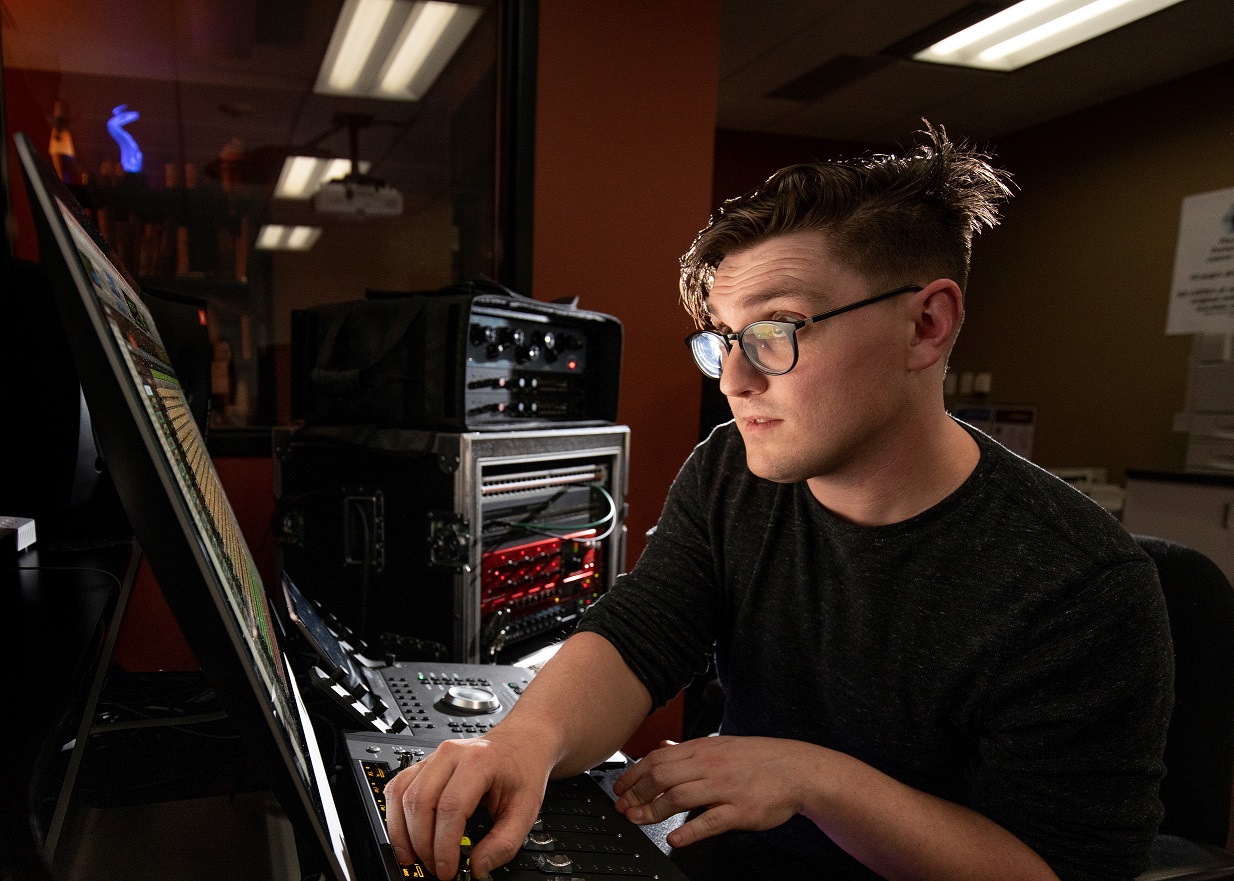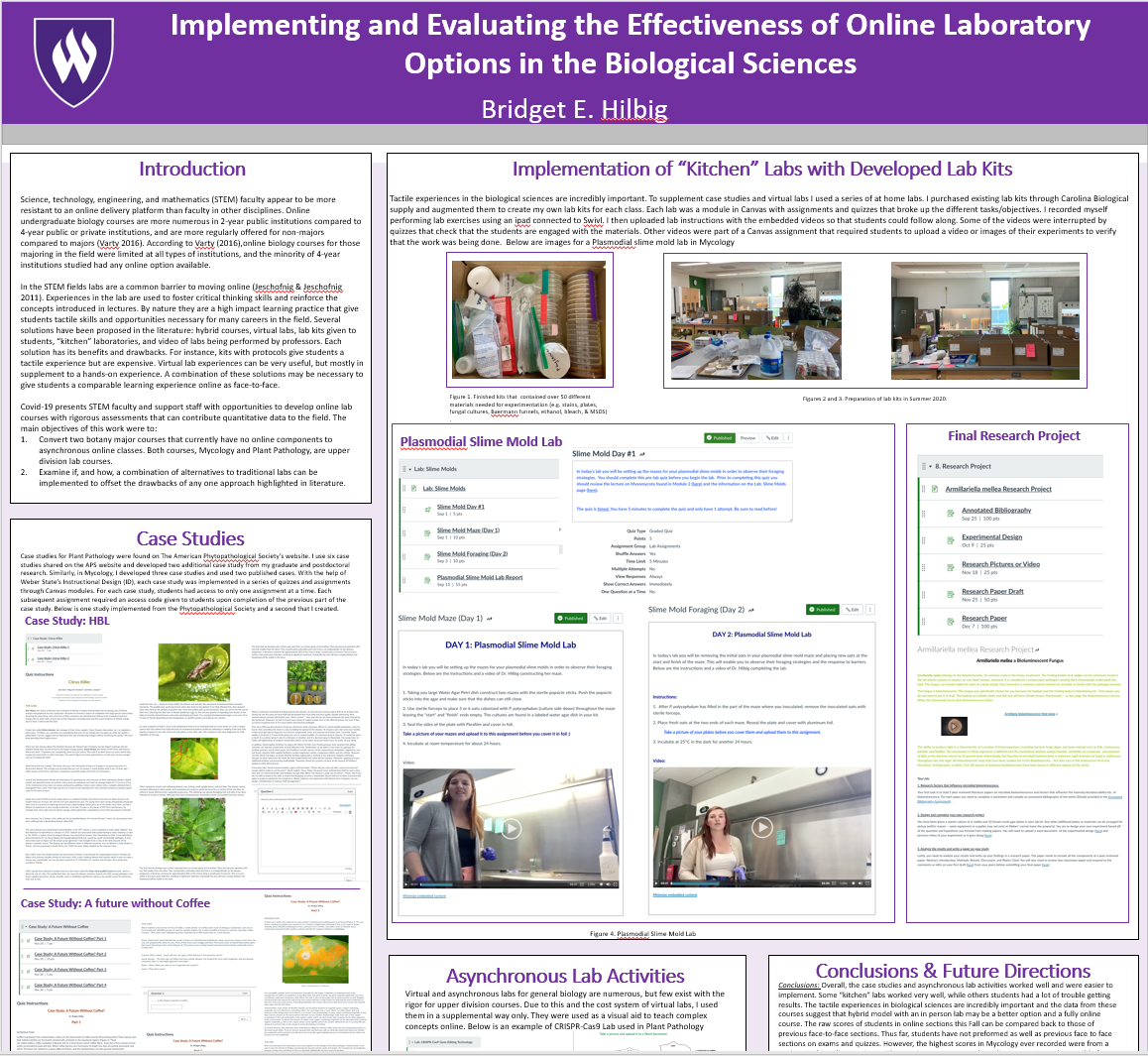
Experiential Learning Innovations
September 21-September 25
College of Arts and Humanities
Jessica Greenberg, School of Performing Arts
Dazzling flashes and warm glows take center stage as Theater professor Jessica Greenberg shows how students will be using professional standard theater lighting software to design and rehearse performances on a virtual stage.
*Technology (Capture) was a result of grant funding and is not currently available at WSU. There are, however, free student versions with limited capabilities.
College of Engineering Applied Science and Technology
Yong Zhang, School of Computing
Out of this world: Professor Yong Zhang from the School of Computing introduces Jupyter Notebooks, an open-source platform for overcoming the academic, hardware, and logistic challenges of teaching programming asynchronously and remotely.
*Technology already available at WSU.
September 28-October 2
College of Engineering Applied Science and Technology
Kyle Feuz, School of Computing
School of Computing faculty, led by Dr. Kyle Feuz, demonstrate how they use content from Pluralsight to help online students master aspects of computer programming.
*Technology was a result of grant funding and is not currently available at WSU outside of the School of Computing.
College of Science
Rachel Bachman and C. David Walters, Math Department
Math Professors Bachman and Walters transition their paper & pencil games to a digital format in an effort to increase math fluency in education students.
*Technology was a result of grant funding but available at WSU because we used a computer engineering student to build the website that was key to our project.
October 5-9
College of Engineering Applied Science and Technology
Tariq Arif, Mechanical Engineering
See how Engineering Professor Tariq Arif uses a graphical user interface to allow students to access MATLAB, a powerful computation software platform, from home to test mechanical stress scenarios.
*Technology already available at WSU.
College of Engineering Applied Science and Technology
Randy Hurd, Mechanical Engineering
More than selfies and twitergrams from your phone. Engineering Professor Randy Hurd implemented Phyphox, an open-source app, to access instrumentation already built into modern phones for mechanical engineering students to have a lab in their hands.
*Technology already available at WSU.
Summary:
A key element of any engineering curriculum is familiarizing students with instrumentation and
measurement techniques; this is generally achieved through a course that exposes students to
common measurement tools and software in a laboratory setting. This traditional lab-based
approach presents unnecessary risks during a global health crisis such as the COVID-19
pandemic. Fortunately, a typical smartphone is a small modern miracle, with the average device
housing vast computational power (more than the Apollo 11 guidance computers), as well as an
array of miniature instruments including accelerometers, gyroscopes, magnetometers,
barometers, microphones, cameras, etc. With a high-speed computer and a suite of modern
sensors, the average smartphone has all the trappings of an engineering lab. An open-source app
“Phyphox” enables the user to tap into any instrument on their smartphone to record and export
measurement data. A screenshot of the Phyphox app collecting acceleration data is shown in
Figure 1. This project included gaining familiarity with the Phyphox App, typical smartphone
sensors and designing two measurement labs that students can perform at home using their
smartphones. The labs still require that students use modern instruments to collect and analyze
measurement data, but without the risks associated with a traditional engineering lab.
October 12-16 October 19-23
College of Social and Behavioral Sciences
Janicke Stramer-Smith, Political Science
Channeling Ronald Reagan: Students take the role as a Security Council member and practice policy negotiation as Political Science Professor Janicke Stramer-Smith merges Model Diplomacy simulations with Canvas.
*Technology already available at WSU.
College of Arts & Humanties
College of EAST
Becky Jo Gesteland, English
Richard Fry, Computer Science
Led by Professors Gesteland (English) and Fry (Computer Science), the Center for Community Engaged Learning created Canvas modules for students and faculty about conducting effective virtual CEL activities.
*Technology already available at WSU.
October 26-30
College of Arts and Humanities
Isabel Asensio, Foreign Language
Because presentational and interpersonal modes of communication are critical in foreign language learning, Professor Isabel Asensio has developed a curated system of instructional videos and online activities for SPAN 1010 students.
*Technology already available at WSU.
College of Social and Behavioral Sciences
Mary Beth Willard and Paul Naiman, Political Science and Philosophy
Unfolding case studies are powerful tools for developing critical thinking skills but are usually conducted as live action events. Philosophy Professors Willard and Neiman developed and are testing a framework for asynchronous unfolding case studies using Canvas groups, modules and discussions.
*Technology already available at WSU.
November 9-13
College of Science
Daniel Clark, Microbiology
On a bug hunt: Microbiology Professor Daniel Clark shows how broadcast microscopy can be used to help students develop skills searching for disease causing parasites live and online.
*USB Microscope: Technology already available at WSU.
College of Science
Elizabeth Balgord, Earth and Environmental Sciences
Geology field courses...ONLINE!?!? With virtual tours and field trips, EES Professor Elizabeth Balgord and her colleagues bring local Utah geologic features to life for students in multiple courses.
*Equipment and software licenses were purchased using grant funding and are now housed in the Department of Earth & Environmental Sciences.
November 16-20
College of Arts and Humanities
Tamara Goldbogen
Mural creation and community service come to life in Ogden with a series of videos on different visual art techniques created by Professor Tamara Goldbogen for the HNRS 1530 ArtsBridge: Murals course.
November 30-December 4
College of Arts and Humanities College of Education
Jean Norman, Communication and Peggy Saunders, Teacher Education
Professors Jean Norman and Peggy Saunders lead a group testing Mursion, a virtual-reality simulation designed to replicate person-to-person interactions in areas such as teaching, foreign language, journalism and health care.
*Technology (Mursion) was a result of grand funding and is not currently available at WSU.
College of Arts and Humanities
Daniel Jonas, School of Performing Arts
Sesame Street comes to life as Performing Arts Professor Daniel Jonas uses high quality portable audio recorders to enable performance ensembles to share their art without playing instruments in the same physical space.
*Technology was a result of grant funding and is not currently available at WSU.
College of Arts and Humanities
Christy Call and Megan Van Deventer, English
English Professors Christy Call and Megan Van Deventer instill equitable teaching practices in secondary ed English teaching students through a series of workshops, collaborative writing assignments and Canvas content creation.
*Technology already available at WSU.
College of Arts and Humanities
Dianna Huxhold, Art Education and Visual Arts
ART 1030 gets a redesign for a virtual studio in the student's home by DOVA professor Dianna Huxhold using Art21 videos, reflection and creation assignments, and virtual studio drop times.
*Technology already available at WSU.
December 7-11
College of Science
Bridget Hilbig, Botany and Plant Ecology
Botany & Plant Ecology Professor Bridet Hilbig tested a variety of online labs experiences including case studies, asynchronous lab activities, and "kitchen" labs with varying success.

College of Education
Alex Collopy, Child and Family Studies
How do students practice teaching when schools are closed? Child & Family Studies faculty, led by Professor Alex Collopy create and curate a library of interviews and observational footage in Kaltura to provide footage to activities running.
*Technology already available at WSU.
Goddard School of Business and Economics
Valerie Chambers, School of Accounting and Taxation
Using Packback, Professor Valerie Chambers augments her virtual discussion boards with an artificial intelligence-based, inquiry-driven interaction platform designed to encourage students deep dive into their questions about the material.
*This service is not officially licenced by the university and duplicates online discussion features offered in Canvas. Any use of student-funded course materials must be provided through the WSU bookstore and may need to include an 'opt-out' feature for the students.